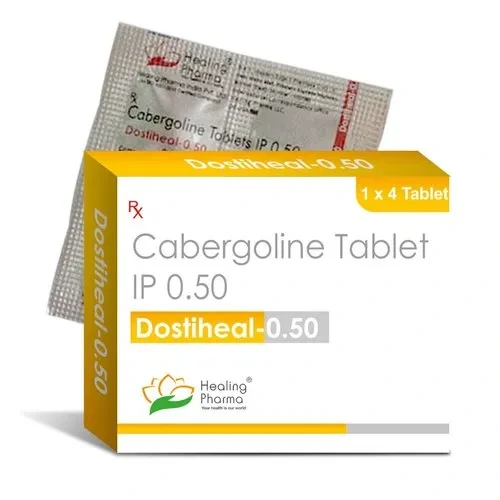Cabergoline 0.50 mg: Uses, Dosage, Side Effects & Prolactin Treatment Guide
What is Cabergoline 0.50 mg?
Cabergoline 0.50 mg is a dopamine agonist used to treat conditions caused by excessive levels of prolactin (a hormone). It lowers prolactin by stimulating dopamine receptors in the brain, which suppresses prolactin release from the pituitary gland. High prolactin levels (hyperprolactinemia) can cause infertility, menstrual problems, and abnormal breast milk production.
🧬 How Cabergoline Works:
Cabergoline mimics dopamine, a natural brain chemical. It binds to dopamine D2 receptors in the pituitary gland, reducing the secretion of prolactin. It’s significantly more effective and longer-acting than older dopamine agonists like bromocriptine.
📋 Indications / Uses:
Cabergoline 0.50 mg is commonly prescribed for:
- Hyperprolactinemia (high prolactin levels)
- Prolactinomas (pituitary tumors producing prolactin)
- Infertility due to hyperprolactinemia
- Menstrual disorders (irregular or absent periods)
- Galactorrhea (inappropriate breast milk production)
- Off-label: Parkinson’s disease, Cushing’s disease, acromegaly (under strict medical supervision)
💡 Dosage & Administration:
⚠️ Always take Cabergoline exactly as prescribed by your doctor.
📌 Standard Dosage for Hyperprolactinemia:
- Initial dose: 0.25 mg twice weekly (e.g., Monday and Thursday)
- Maintenance dose: Adjusted based on prolactin levels, usually up to 1 mg twice weekly
- Tablets can be taken with or without food
💡 Tablets can be split to achieve smaller doses like 0.25 mg.
⏳ Treatment Duration:
- Often taken long-term until prolactin levels normalize
- Dosage may be tapered or discontinued after 6–12 months of normal prolactin levels if symptoms are resolved
⚠️ Precautions:
- Heart valve disease: Rare cases of valve thickening (fibrosis) have occurred with long-term, high-dose use
- Liver disease: Use with caution
- Pregnancy: Use only if clearly needed; may restore fertility
- Mental health: May cause mood changes or impulse control issues (e.g., compulsive gambling, hypersexuality)
🔄 Drug Interactions:
Avoid using with:
- Antipsychotics (e.g., haloperidol, risperidone) — they block dopamine
- Macrolide antibiotics (e.g., erythromycin) — may increase blood levels of cabergoline
- Blood pressure-lowering drugs — can enhance hypotensive effects
- Ergot alkaloids — risk of additive side effects
Always inform your doctor about all medications and supplements you take.
🚫 Contraindications:
- Uncontrolled hypertension
- History of heart valve disorders or fibrosis (lungs, heart, abdomen)
- Allergy to ergot derivatives
- Severe liver impairment
⚠️ Side Effects:
✅ Common:
- Nausea or vomiting
- Dizziness or lightheadedness (especially when standing)
- Headache
- Fatigue
- Constipation
❗ Serious (Seek Medical Attention):
- Chest pain or shortness of breath
- Swelling in legs or feet
- Persistent cough
- Hallucinations or compulsive behavior
- Vision changes
Side effects are often dose-dependent and may improve with dose adjustment.
🤰 Use in Pregnancy & Breastfeeding:
- Pregnancy: Not recommended unless necessary; may restore ovulation
- Breastfeeding: Not advised — suppresses lactation and may pass into breast milk
Women who wish to become pregnant should consult their doctor before stopping treatment.
🧪 Monitoring & Follow-Up:
- Prolactin blood tests (every 4–6 weeks initially)
- Echocardiogram (heart valve check) before starting long-term treatment
- Liver function tests if clinically indicated
📦 Storage:
- Store at room temperature (20–25°C or 68–77°F)
- Keep away from moisture and heat
- Store in original packaging and keep out of reach of children
📈 Effectiveness:
- Prolactin levels typically normalize in 80–90% of patients
- Menstrual cycles and fertility often return within a few months
- Long-term treatment can shrink pituitary tumors in prolactinoma patients









Reviews
There are no reviews yet.